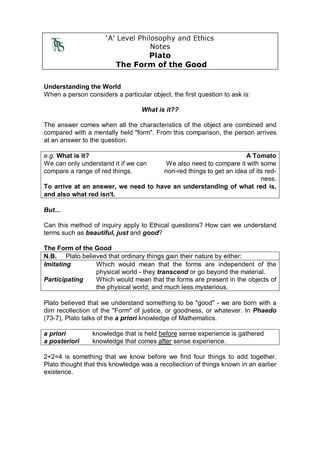Signaler
Partager
Télécharger pour lire hors ligne

Recommandé
Recommandé
Contenu connexe
Tendances
Tendances (14)
Plato's Theory of Forms, and the Sun, Line and Cave

Plato's Theory of Forms, and the Sun, Line and Cave
The case for teaching syllogistic logic to philosophy students 

The case for teaching syllogistic logic to philosophy students
En vedette (15)
Similaire à Plato
Similaire à Plato (20)
AS Philosophy of Religion (OCR): Ancient Greek influences on religious philos...

AS Philosophy of Religion (OCR): Ancient Greek influences on religious philos...
Origins of knowldge 2016 revision 2. concept innatism

Origins of knowldge 2016 revision 2. concept innatism
An Analysis of the Phenomena That Have Led Some Philosophers to Introduce the...

An Analysis of the Phenomena That Have Led Some Philosophers to Introduce the...
Plus de mrhartley
Plus de mrhartley (12)
Dernier
Dernier (20)
Asian American Pacific Islander Month DDSD 2024.pptx

Asian American Pacific Islander Month DDSD 2024.pptx
Web & Social Media Analytics Previous Year Question Paper.pdf

Web & Social Media Analytics Previous Year Question Paper.pdf
Ecological Succession. ( ECOSYSTEM, B. Pharmacy, 1st Year, Sem-II, Environmen...

Ecological Succession. ( ECOSYSTEM, B. Pharmacy, 1st Year, Sem-II, Environmen...
Role Of Transgenic Animal In Target Validation-1.pptx

Role Of Transgenic Animal In Target Validation-1.pptx
Python Notes for mca i year students osmania university.docx

Python Notes for mca i year students osmania university.docx
Measures of Central Tendency: Mean, Median and Mode

Measures of Central Tendency: Mean, Median and Mode
Food Chain and Food Web (Ecosystem) EVS, B. Pharmacy 1st Year, Sem-II

Food Chain and Food Web (Ecosystem) EVS, B. Pharmacy 1st Year, Sem-II
ICT role in 21st century education and it's challenges.

ICT role in 21st century education and it's challenges.
Measures of Dispersion and Variability: Range, QD, AD and SD

Measures of Dispersion and Variability: Range, QD, AD and SD
Micro-Scholarship, What it is, How can it help me.pdf

Micro-Scholarship, What it is, How can it help me.pdf
Z Score,T Score, Percential Rank and Box Plot Graph

Z Score,T Score, Percential Rank and Box Plot Graph
General Principles of Intellectual Property: Concepts of Intellectual Proper...

General Principles of Intellectual Property: Concepts of Intellectual Proper...
Beyond the EU: DORA and NIS 2 Directive's Global Impact

Beyond the EU: DORA and NIS 2 Directive's Global Impact
Plato
- 1. §) (©$!©¥§ ©§¥£¡ '% # ¦ ¨¦¤ ¢ $4 $20 5 3 1 B§A9 86 @ 7 ££aY`FX8FUTRPHF8C b I I E DW V I SQ I G E D Understanding the World When a person considers a particular object, the first question to ask is: What is it?? The answer comes when all the characteristics of the object are combined and compared with a mentally held form. From this comparison, the person arrives at an answer to the question. e.g. What is it? A Tomato We can only understand it if we can We also need to compare it with some compare a range of red things. non-red things to get an idea of its red- ness. To arrive at an answer, we need to have an understanding of what red is, and also what red isn't. But... Can this method of inquiry apply to Ethical questions? How can we understand terms such as beautiful, just and good? The Form of the Good N.B. Plato believed that ordinary things gain their nature by either: Imitating Which would mean that the forms are independent of the physical world - they transcend or go beyond the material. Participating Which would mean that the forms are present in the objects of the physical world, and much less mysterious. Plato believed that we understand something to be good - we are born with a dim recollection of the Form of justice, or goodness, or whatever. In Phaedo (73-7), Plato talks of the a priori knowledge of Mathematics. a priori knowledge that is held before sense experience is gathered a posteriori knowledge that comes after sense experience. 2+2=4 is something that we know before we find four things to add together. Plato thought that this knowledge was a recollection of things known in an earlier existence.
- 2. Plato He believed that we carry a paradigm (or example) of an object. The tangible objects of this world are imperfect imitations of these paradigms. These are the forms. The answer to the question What is a Dog can be answered in terms of the essential nature of a dog - its dogginess. The Ultimate Form is the Form of the Good. An understanding of the Good allows everything else to be valued. While we can carry out good acts in this world, they are a pale imitation of the perfect good that exists as an ideal in the world of ideals. So What? Later Philosophers took Plato's idea of the Form - The idea that there is a Perfect Good can translate into the idea of a ¡ God. Plato's idea of the Perfect Good is also relevant to the argument ¡ about the nature of Evil - Some believe that evil is simply an absence of Good - Absolute Good exists as a perfect ideal, but Absolute Evil is not the opposite. It is not an objective force, but rather a lack of something, rather like a vacuum. The concept of the Form as a transcendent, distant thing to be ¡ imitated, or of a thing that participates in the objects in the physical world, has implications for thinking about the nature of God. If God is transcendent, how can He affect the world. If God participates is the world, can He be omnipresent (everywhere), omnisient (all knowing) c.